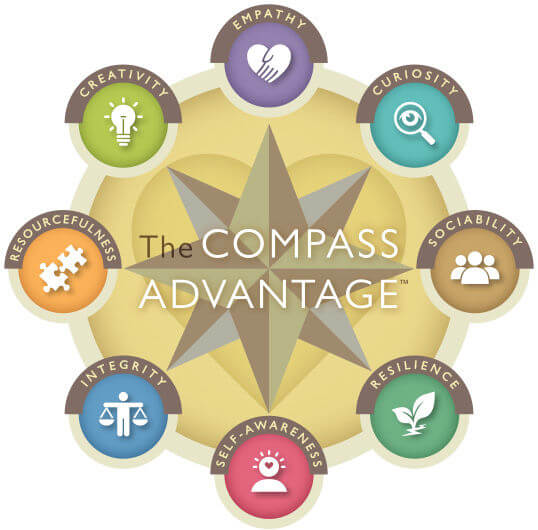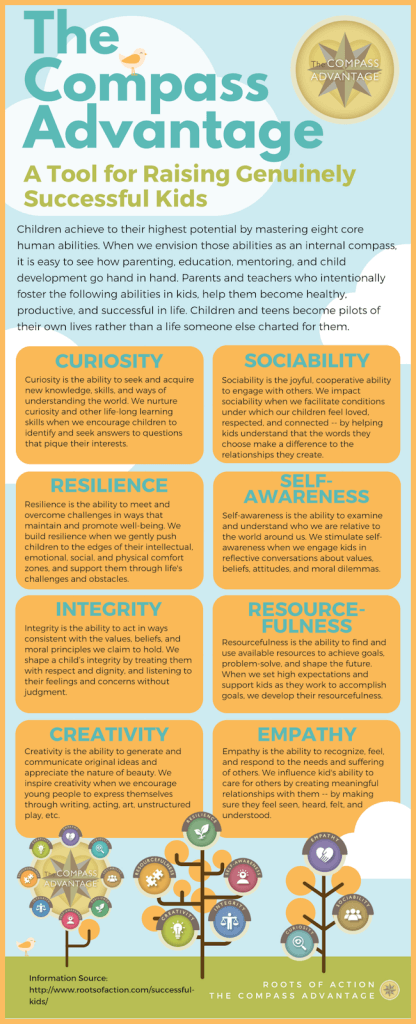
Successful kids get excellent grades, right? They play at least one sport very well.
Successful kids do regular community service and, of course, take Advanced Placement courses. They attend the best colleges and attain great-paying jobs.
Wait.
If you’ve ever envisioned this fairy-tale definition of kids’ success, it’s time to look beyond external measurements to the internal abilities that help children and teens learn to successfully pilot their own healthy and productive lives — today and as future adults.
Based on decades of research in child and adolescent development, neuroscience, education, and psychology, we know what drives successful kids.
Successful kids are not driven by external accomplishments alone. In fact, they are inspired to perform to their highest potential when they are driven by their own internal compasses — a set of self-defining abilities that help them chart their own courses through life.
How does this happen in today’s world, particularly when grades, test scores, and trophies often seem more important than the development of children who are ready to tackle career-life challenges ahead of them?
In a nutshell, it happens when we understand how children and teens successfully mature to adulthood and how we impact their growth in key developmental areas. Relationships with parents, teachers, and other supportive adults determine how school-age children acquire their own personal guidance systems, full of interconnected abilities and pathways to success.
When we envision those abilities as an internal compass, it is easy to see how parenting, education, mentoring, and child development go hand in hand — how children navigate successfully through school and life.
The Compass Advantage:
A Tool for Raising Genuinely Successful Kids
I created The Compass Advantage framework as a visual, research-based, and engaging way for families, schools, and communities to apply the principles of positive youth development in the Digital Age. It’s a tool for understanding why successful kids need eight interconnected abilities and how those abilities are nurtured in different contexts like home, school, sports, hobbies, and out-of-school activities of all kinds.
The compass framework has become the core of my work and research in developmental psychology. It is the foundation of my parent coaching practice via video-conference, providing opportunities for parents to reflect on and apply the principles of positive development with informed guidance. The compass is the basis on which I focus my speaking, organizational consulting, and writing. For me, it is a personal and passionate call to act on behalf of children who deserve to live full and meaningful lives beyond external measures of success.
This article is an overview of The Compass Advantage framework, about how parents can intentionally foster these internal abilities at home. If you are an educator, please see my article on how teachers nurture these eight core abilities in the classroom, published at Edutopia.
Possession of these eight core abilities are considered by many researchers to be hallmarks of truly successful kids. Most experts agree these abilities are also at the root of great leadership! At Roots of Action, you will find free resources that use the compass framework, including “My Parenting Promise,” a frame-ready document that can be downloaded to remind you of the kind of values and habits of thinking that nurture successful kids.
The Compass Abilities
The eight core abilities that all kids need to be healthy, productive, and successful in life are outlined below. When we intentionally parent with these abilities in mind, our children and teens grow to become the pilots of their own lives rather than a life someone else charted for them.
1. Curiosity: The Heart of Lifelong Learning
Curiosity is the ability to seek and acquire new knowledge, skills, and ways of understanding the world. It is at the heart of what motivates successful kids to learn and what keeps them learning throughout their lives. Curiosity facilitates engagement, critical thinking, and reasoning.
We nurture children’s curiosity and other life-long learning skills when we encourage them to identify and seek answers to questions that pique their interests. When we help them recognize failure as an opportunity for exploration, we encourage experimentation and new discovery. We help them understand the tenets of engaged learning when we recognize the different ways they explore — by touching, tasting, climbing, smelling, etc. — and praise them for their perseverance to find answers. When we show them how parts connect and influence the whole of society, they discover that curiosity improves relationships, fuels innovation, and drives social change.
2. Sociability: The Core of Social Learning and Wellbeing
Sociability is the joyful, cooperative ability to engage with others. It is derived from a collection of social-emotional skills that help successful kids understand and express feelings and behaviors in ways that facilitate positive relationships, including active listening, self-regulation, and effective communication.
We impact children’s sociability when we help them understand that the words they choose make a difference to the relationships they create. When we teach them that every social interaction is tied to an emotional reaction, we help them avoid impulsive behavior and think through difficult situations before acting. We also build their capacity for collaborative teamwork.
3. Resilience: The Capacity to Grow from Adversity
Resilience is the ability to meet and overcome challenges in ways that maintain or promote well-being. It incorporates attributes like optimism, grit, persistence, initiative, and determination.
We build resilience when we push children gently to the edges of their intellectual, emotional, social, and physical comfort zones. When we support and encourage them as they take risks, overcome challenges, and grow from failure, successful kids learn to bounce back from life’s ups and downs.
4. Self-Awareness: The Source of Meaning and Purpose
Self-awareness is the ability to examine and understand who we are relative to the world around us. It is developed through skills like self-reflection, meaning-making, and the process of honing core values and beliefs. It is situated at “true south” on the compass to symbolize that introspection is about looking southward, into ourselves. Self-awareness impacts the capacity for successful kids to see themselves as uniquely different from other people.
We stimulate children’s self-awareness when we engage them in reflective conversations about values, beliefs, attitudes, and moral dilemmas. When we encourage them to understand and attend to their intellectual, emotional, social, and physical selves, we let them know we value their full human potential.
5. Integrity: The Basis of Social Harmony and Action
Integrity is the ability to act in ways consistent with the values, beliefs, and moral principles we claim to hold. It’s about courage, honesty, and respect in one’s daily interactions — doing the right thing, even when no one is watching.
We shape a child’s integrity by treating them with respect and dignity, and listening to their feelings and concerns without judgment. When we praise children for demonstrating their values, beliefs, and principles through actions, we remind them of their value as ethical human beings, beyond a grade or test score.
6. Resourcefulness: The Power to Shape the Future
Resourcefulness is the ability possessed by successful kids to find and use available resources to achieve goals, problem-solve, and shape their futures. It draws on skills like planning, goal-setting, strategic thinking, and organizing.
We encourage children to be resourceful when we set high expectations and support them to accomplish their goals. When we teach them to be strategic thinkers and adaptable problem-solvers, they learn to live without rigid rules or preconceived ideas.
7. Creativity: The Epicenter of Exploration and Discovery
Creativity is the ability to generate and communicate original ideas and appreciate the nature of beauty. It fosters imagination, innovation, and a sense of aesthetics.
We inspire creativity when we encourage young people to express themselves through writing, poetry, acting, photography, art, digital media, unstructured play, etc. When we notice and praise them for thinking outside the box and taking risks, children’s imaginations blossom.
8. Empathy: The Root of Caring and Engaged Citizenship
Empathy is the ability to recognize, feel, and respond to the needs and suffering of others. It facilitates the expression of caring, compassion, and kindness. It is situated at “true north” on the compass to symbolize the outward impact of raising young citizens committed to a just and sustainable world for everyone.
We influence the ability of successful kids to care for others beyond themselves by creating meaningful relationships with them — by ensuring they are seen, felt, and understood regardless of how they learn or achieve at school. When we expose them to different worldviews, engage them in family community-service projects, and show them how to treat neighbors with kindness, we develop higher levels of empathy and compassion.
Through The Compass Advantage framework, parenting, education, and child development are viewed as integrated processes nurtured through the collaborative efforts of parents, teachers, and out-of-school programs. When we attend to the development of these eight abilities, the results are transformative for kids. Not only do children become lifelong learners, they become self-sufficient navigators of their own lives.
Compass Advantage Infographic
The following infographic was created from the material in this article. Please feel free to copy, print, and share it with others!
Articles in this Parenting Series
Successful Kids Need 8 Core Abilities: How to Parent With Purpose (Currently Reading)
Curiosity: How Parents Foster Lifelong Learning in Children
Sociability: How Families Learn Together with Love and Respect
Resilience: How Families Grow from Adversity
Self-Awareness: How Parents Foster Meaning and Purpose in Kids
Integrity: How Families Teach and Live their Values
Resourcefulness: How Parents Help Children Achieve Goals
Creativity: How Parents Nurture the Evolution of Children’s Ideas
Empathy: How Families Lead with Gratitude and Kindness
Free Resources for Parents
My Parenting Promise: a frame-ready document that helps reinforce the compass abilities through parenting practices.
I Have a Dream: a frame-ready document created by youth — to discuss with your children.
Reframing Success: Helping Children & Teens Grow from the Inside Out: an eBook that introduces The Compass Advantage. This eBook has been widely used by schools as a “Book Club” reading to engage parents about raising healthy children and teens.
Photo Credit: Igor Yaruta
Published: September 12, 2016





